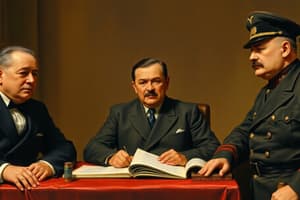Podcast
Questions and Answers
What did the Munich Agreement allow Nazi Germany to do in 1938?
What did the Munich Agreement allow Nazi Germany to do in 1938?
- Declare war on France and Britain
- Create a military alliance with Italy
- Annex Sudetenland from Czechoslovakia without military action (correct)
- Invade Austria without international repercussions
What was the main consequence of the League of Nations' failure to prevent conflicts?
What was the main consequence of the League of Nations' failure to prevent conflicts?
- Demonstrated its ineffectiveness in preventing conflicts (correct)
- Increased global peace and stability
- Resulted in successful conflict resolutions
- Led to the dissolution of the League of Nations
What was the primary assumption behind the appeasement policy towards Germany?
What was the primary assumption behind the appeasement policy towards Germany?
- Hitler would seek diplomatic solutions to disputes
- Germany was not a threat to neighboring countries
- Germany sought to create a peaceful Europe
- Hitler would settle for territorial gains without further aggression (correct)
How did the Munich Agreement impact Hitler's future actions?
How did the Munich Agreement impact Hitler's future actions?
What lesson did the League of Nations' failures teach about existing peace mechanisms?
What lesson did the League of Nations' failures teach about existing peace mechanisms?
How did the appeasement policy ultimately contribute to Germany's actions before World War II?
How did the appeasement policy ultimately contribute to Germany's actions before World War II?
What was the name of the treaty signed in 1919 that held Germany responsible for causing World War I?
What was the name of the treaty signed in 1919 that held Germany responsible for causing World War I?
Which organization, established after World War I to promote peace, failed to prevent the outbreak of World War II?
Which organization, established after World War I to promote peace, failed to prevent the outbreak of World War II?
What major event in the 1930s led to the rise of extremist political parties like Nazi Germany and Fascist Italy?
What major event in the 1930s led to the rise of extremist political parties like Nazi Germany and Fascist Italy?
What was the main reason for the immense hardship and resentment among Germans after World War I?
What was the main reason for the immense hardship and resentment among Germans after World War I?
Which country's aggressive militarism and violation of international law led to it being blamed for causing World War I?
Which country's aggressive militarism and violation of international law led to it being blamed for causing World War I?
What term is used to refer to the period between World War I and World War II?
What term is used to refer to the period between World War I and World War II?
Flashcards are hidden until you start studying
Study Notes
Pre-War Events and Legislation
The period leading up to World War II was marked by significant political, social, and economic changes in Europe. This period, often referred to as the interwar years, saw the rise of extremist movements and the disintegration of multilateral organizations designed to maintain peace in Europe. In this article, we will look at some key pre-war events and legislation that contributed to the outbreak of the Second World War.
Treaty of Versailles
One of the most significant pre-war events was the signing of the Treaty of Versailles in 1919. After World War I, Germany was held responsible for causing the war due to its aggressive militarism, expansionist policies, and violation of international law. As a result, Germany was forced to pay a large reparations payment, which caused immense hardship and resentment among Germans.
Rise of Extremist Movements
In the aftermath of the Great Depression of the 1930s, many people in Europe became disillusioned with their governments, resulting in the rise of extremist political parties such as Nazi Germany and Fascist Italy. These parties exploited the crisis and promised stability through extreme measures.
League of Nations
Another major event during this time was the failure of the League of Nations, which was established after World War I to promote peace and cooperation between nations. Despite having the best intentions, the League failed to prevent the Japanese invasion of Manchuria in 1931 and the Italian invasion of Ethiopia in 1935, demonstrating its ineffectiveness in preventing conflicts.
Munich Agreement
In September 1938, the Munich Agreement was signed, allowing Nazi Germany to annex Sudetenland from Czechoslovakia without resorting to military action. While it avoided a conflict initially, it emboldened Hitler's belief that he could get away with aggression in exchange for limited concessions, setting a dangerous precedent for future actions.
Appeasement Policy
During the period before World War II, the majority of western powers followed an appeasement policy toward Germany. This involved giving Hitler what he wanted under the assumption that he would settle for territorial gains rather than invade other countries. However, this approach ultimately allowed Germany to expand its territory and strengthen its military capability, paving the way for more aggressive actions in the future.
These events and legislations played a crucial role in shaping the events leading to World War II. They highlighted the weaknesses of existing peace mechanisms and demonstrated how political and economic instability can contribute to armed conflict. Understanding these historical contexts is essential when considering contemporary global issues related to diplomacy, security, and international relations.
Studying That Suits You
Use AI to generate personalized quizzes and flashcards to suit your learning preferences.




